Internet Addiction Test
Internet Addiction Screening Exam
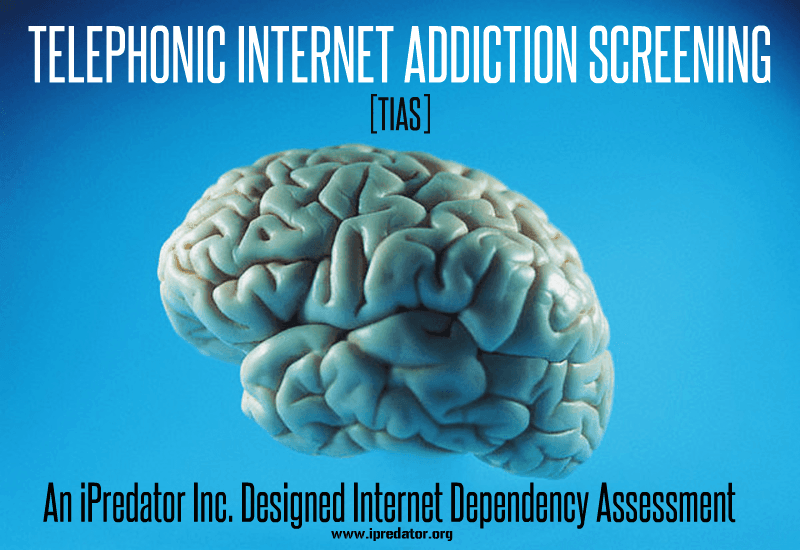
Internet Use Disorder
iPredator Internet Addiction Services
Michael Nuccitelli, Psy.D. offers a confidential telephonic internet addiction screening (TIAS). He is a NYS licensed psychologist and author of the online assailant construct, iPredator. He is available to conduct telephonic sessions with those seeking to assess if they, their child, loved one or associate is experiencing problematic internet usage. Interested parties are encouraged, but not required, to complete Dr. Nuccitelli’s Internet Addiction Risk Checklist (IARC). For direct access to the checklist, please click on the following hyperlink: Internet Addiction Risk Checklist (IARC) Upon completion, contact iPredator Inc. by phone at 347-871-2416 or the Contact Us Page.
Consumers are contacted within 24 hours to schedule a telephonic consultation. The cost of a Telephonic Internet Addiction Screening (TIAS) is $300.00 (USD), takes 45-60 minutes to complete and includes all follow-up contacts.
Note: In exchange for compensation of his services, Dr. Nuccitelli, is willing to waive all fees with documentation verifying the same amount has been donated to a charitable cause involving online safety, mental health or online victimization.
Telephonic Internet Addiction Screening
TIAS: A Telephonic Internet Addiction Screenings (TIAS) is a 60–90-minute telephonic interview designed to assess if an online user, their child, loved one or associate is suffering from a pathological pattern of Information and Communications Technology (ICT) usage. The preferred tool used in a TIAS, not required but encouraged, is the Internet Addiction Risk Checklist (IARC). Similar in structure as the IARC, the TIAS evaluates cognitive, affective, behavioral and perceptual consequences experienced by the respondent from habitual ICT usage.
In addition to examining a respondent’s consequences from ICT usage, the TIAS investigates if the respondent is Cyber Sex Fixated, Cyber Relationship Fixated, Internet Gaming & Online Commerce Fixated, Information Implosion Fixated, Dark Side Fixated or NOS (Not Otherwise Specified) Fixated. Once all data has been aggregated, recommendations are provided to address the negative consequences related to the target respondent’s Information and Communications Technology (ICT) usage.
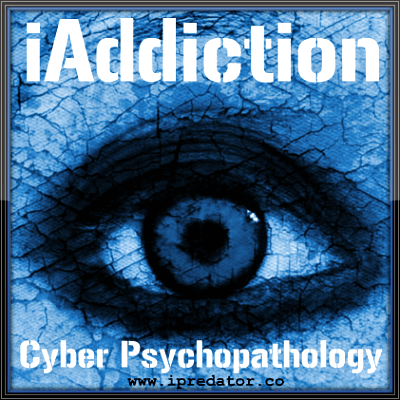
iAddiction
Internet Addiction (aka Addiction) describes an online user’s potential to become compulsive dependent upon the internet and other forms of Information and Communications Technology. Michael Nuccitelli Psy.D. a New York State licensed psychologist and author of iPredator, has developed a diagnostic screening tool, Internet Addiction Risk Checklist (IARC), to assess if a child or adult online user is engaging in pathological internet use. Along with the IARC, if previously completed, Dr. Nuccitelli conducts telephonic internet addiction screenings offering his professional advice on an effective course of action.
Although there is an ongoing controversy among healthcare professionals and organizations regarding the existence of a formal internet addiction disorder, the reality is a growing number of online users are experiencing signs and symptoms suggestive of an Information and Communications Technology (ICT) compulsive dependency. These negative consequences are problematic, self-destructive, and harmful to the afflicted online user’s loved ones, peers and associates. Given that healthcare has yet to agree upon a formal definition or even the existence of an Internet Addiction Disorder, provided here is Dr. Nuccitelli’s Internet Abuse and Internet Dependence definitions along with his iPredator construct definition and TIAS description.
Internet Addiction Disorder: Type I
INTERNET ABUSE
Internet Abuse: Internet Abuse (aka Internet Addiction & Internet Use Gaming Disorder) is an umbrella concept defining a child or adult’s compulsive and progressive abuse of the internet and electronic devices designed to obtain, exchange or disseminate information. Although the internet is the predominate arena in which Internet Abuse takes place, electronic devices and communications channels not internet enabled are also included in the definition. Internet Abuse causes dysfunctional cognitive, affective, behavioral & perceptual intrapersonal consequences accompanied with employment, academic, familial, peer & intimate partner interpersonal consequences.
On a continuum of severity, ranging from absent to mild, cessation of Internet and/or electronic device usage causes withdrawal symptomatology, psychological and/or physiological, combined with perceptual tolerance. Also, on a continuum of severity, Internet Abusive online users engage in criminal, deviant and/or deceptive online activities ranging from absent to severe.
The chronic and more debilitating condition, Internet Dependence, is more chronic, severe and self-destructive. Internet Abuse is segmented into six typologies as follows: Cyber Sex Fixated, Cyber Relationship Fixated, Internet Gaming & Online Commerce Fixated, Information Implosion Fixated, Dark Side Fixated and NOS (Not Otherwise Specified) Fixated. The NOS Fixated typology applies to internet abusing online users who share more than one typology, has a co-existing mental illness or medical condition causing psychiatric dysfunction.

Internet Addiction Disorder: Type II
INTERNET DEPENDENCE
Internet Dependence: Internet Dependence (aka Internet Addiction & Internet Use Gaming Disorder) is an umbrella concept defining a child or adult’s compulsive and progressive dependency upon the internet and electronic devices designed to obtain, exchange or disseminate information. Although the internet is the predominate arena in which Internet Dependence takes place, electronic devices and communications channels not internet enabled are also included in the definition. Internet Dependence causes dysfunctional cognitive, affective, behavioral & perceptual intrapersonal consequences accompanied with employment, academic, familial, peer & intimate partner interpersonal consequences.
On a continuum of severity, ranging from mild to severe, cessation of Internet and/or electronic device usage causes withdrawal symptomatology, psychological and/or physiological, combined with perceptual tolerance. Also, on a continuum of severity, Internet Dependent online users engage in criminal, deviant and/or deceptive online activities ranging from mild to severe.
The mild and less debilitating condition, Internet Abuse, is not as chronic, severe or self- destructive. Internet Dependence is segmented into six typologies as follows: Cyber Sex Fixated, Cyber Relationship Fixated, Internet Gaming & Online Commerce Fixated, Information Implosion Fixated, Dark Side Fixated and NOS (Not Otherwise Specified) Fixated. The NOS Fixated typology applies to internet dependent online users who share more than one typology, has a co-existing mental illness or medical condition causing psychiatric dysfunction.
TYPES OF INTERNET ADDICTION
Cyber Sex Fixated

Comforted by the “veil of anonymity” available to all ICT users, cybersex addiction (aka Internet Sex Addiction) is the compulsive use of ICT driven by the obsessive need for sexual gratification. Whether viewing this psychopathology as a combination of sex addiction and internet addiction or a new disorder, cybersex addicted online users habitually access pornographic images and videos, seek out online contacts receptive to engage in sexually themed interactions and use ICT for sexual gratification.
For Cyber Sex Fixated ICT users, they are enveloped by the addiction to internet pornography, adult chat rooms, adult fantasy role-play websites, sexually themed social networking sites, instant messaging, phone calling, tweeting and texting like-minded ICT contacts.
Cyber Relationship Fixated
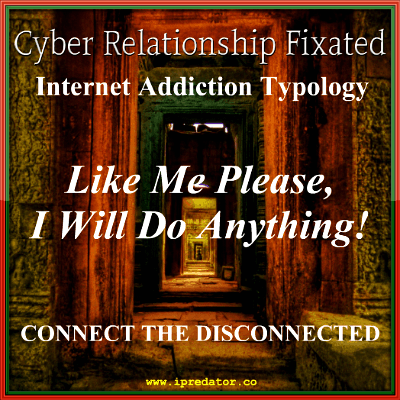
Heavily influenced by wanting to engage in a close social relationship, Cyber Relationship Addiction is fueled by the compulsive need and fixation upon being part of, accepted and recognized by another person. For the Cyber Relationship fixated ICT user, online dating sites, chat rooms and various social networking sites becomes their habitual repertoire for all ICT usage. Common, but not necessary, for the Cyber Relationship Fixated ICT user frequenting websites and forums that are sexually themed.
Whereas the Cyber Sex Fixated ICT user is fixated upon sexual gratification, the Cyber Relationship Fixated ICT user is obsessed with the acquisition of sexual and non-sexual intimate partnerships. For Cyber Relationship Fixated ICT users, they are enveloped by the addiction to social networking, chat rooms, instant messaging, phone calling, tweeting and text messaging.
Gaming & Online Commerce Fixated

The ICT user who is Gaming & Online Commerce Fixated, spends most of their ICT time engaged in browsing, purchasing, gaming and betting at online shopping websites, online gaming websites, virtual casinos, auction sites and interactive gaming sites. Of the many sub types of Internet Addiction, the Gaming & Online Commerce Fixated typology is usually the costliest. The thrill and excitement of competition educated consumerism and gambling are primary motivating factors. Compulsive online gaming, stock trading, virtual casinos and online auction sites are most detrimental to adults, while online gaming sites are the pediatric proverbial “opium” for children.
Information Implosion Fixated
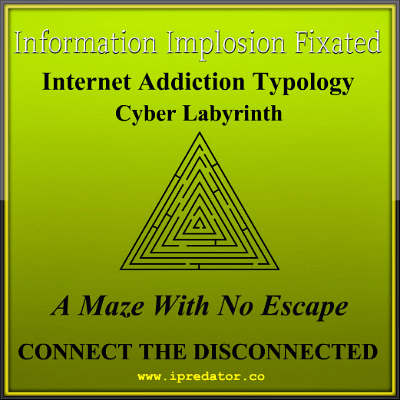
Synonymous terms to the Information Implosion Fixated ICT user are “information addicts,” “dataholics” or an ICT user suffering from “infobesity.” Given the infinite amount of information and data available to all ICT users on the internet, the Information Implosion Fixated ICT user is fixated upon the unending amount of available information he/she can obtain, exchange and disseminates. Obsessed with information and data, this typology of Internet Addiction spends inordinate amounts of time engaged in compulsive Web surfing and database searches. For them, the amount of information is the addiction and not the themes of the information they acquire.
Dark Side Fixated
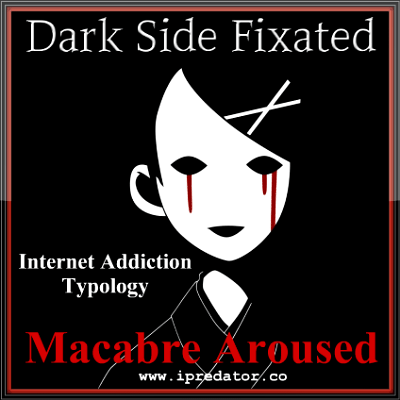
Rarely discussed in the Internet Addiction typology research is the Dark Side Fixated ICT user. The Dark Side Fixated ICT user is an ICT who is obsessed with all thinks anti-social, racial, bigoted, violent, criminal, deviant and bizarre. This typology is one the following types: Information Accessibility Fixated, ICT Gaming & E-Commerce Fixated, Cyber Relationship Fixated or Cyber Sex Fixated, but the theme and content that colors their fixation is perceptually distorted.
Serial Murder websites, Sado-Masochism adult dating sites, violence/death/murder and obscene material, fascinated by dark elements of religious dogmas, attempts to socially connect with like-minded ICT users and seeks out like minded ICT users to taunt, disparage and scare others.
Internet Addiction Disorder
It is common knowledge, needing no clinical citations, to state that people who suffer from addiction, mood-mind altering substance disorders and non- mood-mind altering substance disorders, are at much higher rates of committing criminal, deviant and dysfunctional. The inclusion of Internet Use Gaming Disorder in the 2013 Diagnostic and Statistical Manual of Mental Disorders, DSM-5, is the step in humanity recognizing the Information Age is a real period in human civilization. Although the DSM-5 has many opponents for various reasons, the discussions alone in 2013 on Internet Addiction validates how important Information and Communications Technology has become to citizens of the Information Age.
“Although the benefits of Information and Communications Technology far outweigh detriments for society, humanity has been seduced by the notion that more technology translates into a better quality of life.” Michael Nuccitelli Psy.D.,
Michael Nuccitelli, Psy.D.
Michael Nuccitelli, Psy.D. is a NYS licensed psychologist, cyberpsychology researcher and online safety educator. In 2009, Dr. Nuccitelli finalized his dark side of cyberspace concept called iPredator. Since 2010, he has advised those seeking information about cyberbullying, cyberstalking, cybercriminal minds, internet addiction and his Dark Psychology concept. By day Dr. Nuccitelli is a practicing psychologist, clinical supervisor and owner of MN Psychological Services, PLLC. After work and on the weekends, he volunteers helping online users who have been cyber-attacked. Dr. Nuccitelli’s is always available to interested parties and the media at no cost. This website and everything created by Dr. Nuccitelli is educational, free and public domain.
